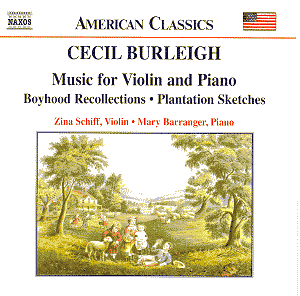As with so many talented young Americans, violinist
Cecil Burleigh went abroad to study in Berlin with the distinguished
Anton Witek. Back home he continued his studies with Emile Sauret
in Chicago and embarked on a career as a concert soloist with
some success. Gradually however weariness of touring led to an
abandonment of his soloistic ambitions and he began teaching and
resuming the composition lessons he’d first taken at the Kladworth-Scharwenka
Conservatoire in Berlin; his new teacher was Ernest Bloch and
for violin, Leopold Auer, in an attempt, thwarted, to resume his
career as an instrumentalist. From 1921-55 he was professor of
violin, theory and composition at the University of Wisconsin.
Burleigh’s charming little miniatures have fared
poorly on disc over the years. I knew his name only through 78s
of Toscha Seidel, who recorded the Indian Snake-Dance, Margaret
Harrison’s Plantation Sketches disc and some pieces laid down
by Heifetz and Sherry Kloss; the excellent Harry Solloway also
recorded a couple of genre pieces but other than these the discography
is silent. So it’s a warm welcome to this Naxos newcomer. Most
of the pieces here are genre, mood or sketches, lasting barely
two minutes in the main. The Americana is nicely spiced but equally
it’s laced with decorum for whilst some of these pieces demand
technique most rely on wry charm and dancing momentum. Some highlights
then; the wistful minor section of the 1911 Impromptu and the
vibrant, showy bow arm speciality piece Reapers from Nature’s
Voice. MacDowell is evoked in To the Warriors from the
Five Indian Sketches but From a Wigwam is the most interesting
of this set, supple and lyrically interpreted by Schiff, a Heifetz
pupil, and Barranger. A Log Cabin is the most distinctive of the
tuneful Plantation Sketches and Idyle from the Characteristic
Pieces (1910) is more than quietly in thrall to Dvořák.
In general the influence is along the Schumann-Dvořák-MacDowell
line and no worse for it; there’s plenty of dancing vigour in
Yule-Tide from Six Fancies and open-hearted warmth
and some swashbuckle in Jim, the piece that concludes the 1925
set of Boyhood Recollections.
Though Burleigh wrote extensively – concertos,
symphonies, violin sonatas, quartets and vocal works – only these
little character pieces have made any, and even then limited,
impression. Born in the same few years as his fellow American
fiddlers Francis Macmillen, Albert Spalding and Florizel von Reuter,
Burleigh never stood much of a chance on the domestic platform
but it’s good to know that his genre bagatelles live on.
Jonathan Woolf
see also review
by Gwyn Parry-Jones
